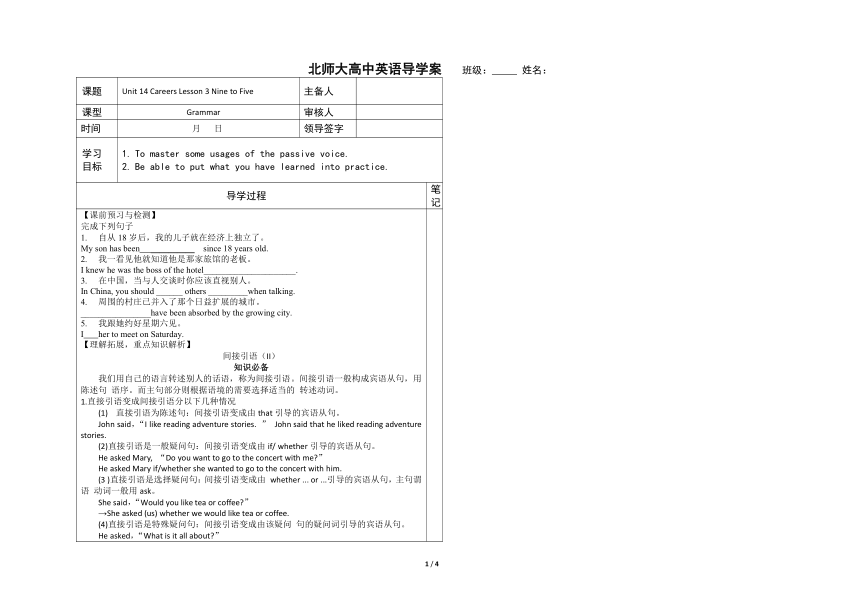
北师大高中英语导学案 班级: 姓名: 课题 Unit 14 Careers Lesson 3 Nine to Five 主备人 课型 Grammar 审核人 时间 月 日 领导签字 学习 目标 To master some usages of the passive voice. Be able to put what you have learned into practice. 导学过程 笔记 【课前预习与检测】 完成下列句子 1. 自从18岁后,我的儿子就在经济上独立了。 My son has been _____ since 18 years old. 2. 我一看见他就知道他是那家旅馆的老板。 I knew he was the boss of the hotel_____. 3. 在中国,当与人交谈时你应该直视别人。 In China, you should _____ others _____when talking. 4. 周围的村庄已并入了那个日益扩展的城市。 _____have been absorbed by the growing city. 5. 我跟她约好星期六见。 I her to meet on Saturday. 【理解拓展,重点知识解析】 间接引语(II) 知识必备 我们用自己的语言转述别人的话语,称为间接引语。间接引语一般构成宾语从句,用陈述句 语序。而主句部分则根据语境的需要选择适当的 转述动词。 1.直接引语变成间接引语分以下几种情况 (1) 直接引语为陈述句:间接引语变成由that引导的宾语从句。 John said,“I like reading adventure stories. ” John said that he liked reading adventure stories. (2)直接引语是一般疑问句:间接引语变成由if/ whether引导的宾语从句。 He asked Mary, “Do you want to go to the concert with me?” He asked Mary if/whether she wanted to go to the concert with him. (3 )直接引语是选择疑问句:间接引语变成由 whether ... or ...引导的宾语从句,主句谓语 动词一般用ask。 She said,“Would you like tea or coffee?” →She asked (us) whether we would like tea or coffee. (4)直接引语是特殊疑问句:间接引语变成由该疑问 句的疑问词引导的宾语从句。 He asked,“What is it all about?” →He asked what it was all about. 2.直接引语变成间接引语时,除语序要变成陈述句语序外,还有下列内容需要做出相应的变化。 (1) 人称的变化。 a.“一随主”。直接引语的主语为第一人称,变为 间接引语时,从句主语应与主句主语一致。 He said,“I like pop music. ” → He said he liked pop music. b. “二随宾”。直接引语的主语为第二人称,变为 间接引语时,从句主语应与主句中的宾语一致。 He told me,“You should hand it in on Friday. ” →He told me that ___should hand it in on Friday. c. “三不变”。直接引语中的主语为第三人称,变 为间接引语时,从句主语可以不变。 Mr. Smith said,“She is my workmate. ” →Mr. Smith said that she was his workmate. (2) 时态的变化。 主句的谓语动词是一般过去时,直接引语变间接引语时,从句谓语荦词的时态一般也要 作相应的变化。如果主句的谓语动词是现在时,则从句的时态可以不变。 j 直接引语变间接引语时的时态变化 直接引语间接引语一般现在时→—般过去时He said,“I’m afraid, I can’t finish the work.”He said that he was afraid he couldn’t finish the work.现在进行时→过去进行时He said,“I’m using the bike.” He said that he was using the bike.现在完成时→过去完成时“l have been to Sydney,” said John.John said that he had been to Sydney.一般过去时→过去完成时“We went water skiing,” the boys said.The boys said that they had gone water skiing.一般将来时→过去将来时She announced,“I’m going to write a new book soon. ”She announced that she was going to write a new book soon.含情态动词的→该情态动词的过去式“Whic ... ...
~~ 您好,已阅读到文档的结尾了 ~~